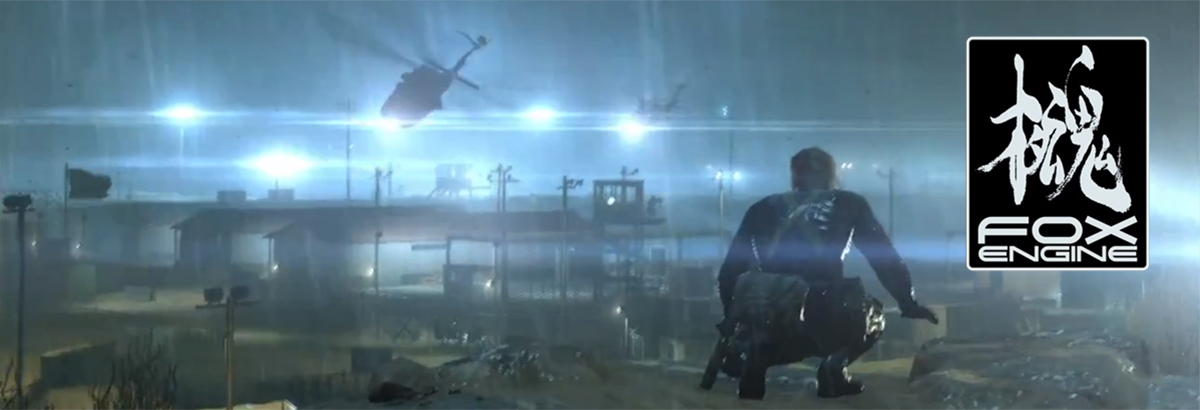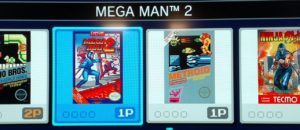The PAX conference in Seattle this past weekend was a big deal for ‘Metal Gear’ fans. Konami and Kojima Productions revealed a fifteen minute ‘Metal Gear Solid: Ground Zeroes’ teaser and a demonstration of the new FOX gaming engine. Just what kind of impact can the FOX engine have on the future of HD gaming?
Unless you’re current on your ‘Metal Gear’ mythos and the growing backstory for Big Boss (‘Metal Gear Solid 3’, ‘Metal Gear Solid: Peace Walker’), the intricacies of the new game’s plot will likely escape you. In that case, just focus on the following video as a demonstration of its engine. Specifically, look at how everything lights, the detail in the characters matched against the complexity of the animations, and keep in mind that this is not pre-rendered.
https://youtu.be/L5IVOs5Pxh8?hd=1
This real-time demonstration is running off a PC. Indeed, the stated intent of the FOX engine is to be a multi-platform engine and development toolset from its inception. This kind of focus means that it will be designed to deploy on the PC, Xbox 360 and PS3 platforms today, and to be ready to transition to tomorrow’s platforms as well.
‘Metal Gear Solid: Ground Zeroes’ looks to sport the visual extravagance of ‘Metal Gear Solid 4: Guns of the Patriots’ (one of the few console games rendered in true 1080p) while incorporating gameplay concepts and the character focus of ‘Peace Walker’, which was originally a PSP title. The ‘Metal Gear’ series, despite its popularity, is still a niche series. The FOX engine is meant in part to bring in the 360 and PC crowd from the get-go. ‘Ground Zeroes’ also promises an open environment and gameplay that continues in earnest past being detected, which is all about getting more people to play and replay ‘Metal Gear’.
By targeting current consoles, the FOX engine (and new engines under development at other studios in the East and West) may continue to extend this generation’s lifecycle. It has already been rumored that the new ‘Zone of the Enders’ project could be built in the FOX engine. It seems clear that Hideo Kojima and Kojima Productions will continue primarily to produce ‘Metal Gear’ titles, but with the FOX engine, their focus will no longer be on handheld platforms. Konami also owns several other properties such as ‘Silent Hill’, ‘Castlevania’ and ‘Pro Evolution Soccer’ that may see future installments developed for the FOX engine.
If Konami shifts to using a unified engine throughout its title production, other Japanese publisher/developers may follow suit. The potential benefit for collaboration between internal development teams from companies like Capcom, Tecmo, Sony, Nintendo, etc. cannot be understated. Projects that now seem too expensive and difficult to undertake could be become reality, and could lead to years of games that push the limits and make for incredible HD content.
However, subscribing to this kind of domino theory, wherein a change in philosophy and success go hand-in-hand, also means acknowledging the possibility of a negative outcome. Konami has put years into the FOX engine. If it’s not perceived as a success, more and more companies will withdraw from the competition of producing HD games.
For now, we can celebrate 25 years of the ‘Metal Gear’ franchise. Going all the way back to the MSX/NES era, this series has never failed to impress. Every time it seems to have stumbled, it has just returned even stronger than before. The new tech and the new gamepley direction make it look like the best is yet to come for ‘Metal Gear’.







Aaron Peck
This is a Robert Zemeckis wet dream.
I wouldn’t be surprised if he’s commandeered this technology for his next movie.
Also, I want that game. Now.
Brian Hoss
Aaron Pack, President and CEO of the Uncanny Valley.
Eric Hulen
Wow! That sure did look good. It gives us taste of what the next gen console graphics will look like. I’m sure the 360 and PS3 version will look a bit downgraded.
I hope the Japaneses companies start to use a unified engine because there games seem to take forever to come out(see the last Final Fantasy and The Last Guardian). We’ve kind of see that with Capcom’s MT framework engine help.
Brian Hoss
From what I can tell from last year’s information, the FOX engine will allow you to push to a triple kit environment. So in-editor you can grab a controller and walk (or fly the camera around) and see the result in the editor window on the PC and running simultaneously on the PS3 and 360 test kits.
This alone would be a boon for Capcom by cutting way down on the time spent porting while producing a more consistent and improved visual quality.
JM
How well does the FOX engine compete with Unreal Engine 4?
Or Square Enix’s new Luminous Studio engine, or Valve’s Source 2, or Crytek’s CryEngine 3, or Ubisoft’s new engine for Watch Dogs?
In terms of development costs being our main bottleneck, which engine is doing the best to create 10x the art and animation efficiency?
Brian Hoss
Epic’s primary goal with Unreal Engine 4 is for the engine to be licensed by other companies. The process they use for incorporating new middle-ware solutions (Speedtree, Kynagon, Beast, etc.), the symbiotic relationship they have with licensees (many engine modifications my by the licensee wind up becoming part of Unreal), and the commitment to multiplatform (included mobile) development should enable continued success with licensing.
However, Unreal licensing is expensive and requires a specific, if popular, kind of art production. And both when becoming a licensee and deploying the engine to a platform, a lot of what you are paying for in terms of money and system resources may not be beneficial for your game.
Square Enix’s current approach is to have one (killer) engine per studio. Most developers have one engine that is constantly modified for each new project, the difference here is that Square Enix has allowed and encouraged specific studios to develop new engines from scratch.
Engines descended from Quake, like Source, sacrifice the detail of model heavy engines for the quicker production and rendering of BSP. Without having to rely on model instancing, BSP can actually achieve greater detail, especially with a quicker pipeline. That is my big question with regards to Source 2 development.
The thing about rating and comparing these engines, even without getting in the weeds and bringing something from prototype to ship is that they are built to and compared based on the ability to render realistic characters in realistic environments. Even something like Final Fantasy 13 is still basically grounded in realism. What I would wish for, in terms of this kind of design (which is predominant in AAA games) would be an engine that can cheaply mange animations. It still seems like the best way to get an acceptable game like this (animation-wise), is to start with motion capture, and then have animators tailor and splice what ends up being something that is still heavy in RAM and rendering. Let’s say the successor to the 360 had an animation rig built into it, and could interpolate new animations with slight overhead, I think that would allow a dramatic jump in both animation efficiency as well as help standardize and quicken the entire art production pipeline.
I’m looking at the FOX Engine more from a philosophic change for Kojima Productions. If the intent is not to spend forever in XSI to make what ends up being a beautiful model that then has to be reduced just for its five seconds in game, then I think they are working (along with other points I mentioned) towards more manageable projects for more accessible production methods and (accessible) games.
The bottom line is money, but the bottleneck is time. A two year project that turns into a four year project can really never get those extra two years back. Square Enix is working on the third Final Fantasy XIII game but can they get the years (and design choices) that the project was a PS2 game back?
JM
Some guys I knew were artists on Prey 2 before it got killed.
I wonder how much time waste can be reduced by better engines, versus how much time waste needs to be solved by better management?
And even if these graphics pipelines could improve art and animation enough to avoid the uncanny valley, is there any significant progress being made in the quality of writing, acting, and diversity of storytelling?
I just started playing The Witcher 2 on 360 and most of the flaws have nothing to do with graphics.
Thanks for the overview. I’m keeping my fingers crossed that the power of the FOX engine will help make Metal Gear 5’s cutscenes a lot shorter.
Brian Hoss
I have friend/colleague that pretty much has derived this production concept- if there is open talk about a level or feature being cut, or a project being cancelled then inevitably it will be. Still companies tend to want keep lame duck projects going for one reason or another (keeping people busy, assuage an ego or someone’s pet project). Obviously poor production is a killer, but it is really part of a larger problem. From pre-production to even after the game ships, the volume of decisions is huge and vetting the immediate outcome is hard, and the long term even harder. Vetting people- evaluating what they are capable of and putting them in the best situation to succeed is the big challenge.
Getting a single vision that will be fun and is feasible within monetary and technical budgets and can stay on schedule does not always go hand-in-hand with having the best people managers. In general, there is so much cart before horse that games ship (or don’t) unfinished and yet with so much wasted work.
Hideo Kojima is relentless, and he drives his vision and his quality standard. Unfortunately, pitching dramatic leaps in the quality of writing and acting, and diversity of storytelling is not a traditional technique for getting games funded. L. A. Noire is a great example of making strides, but still falling short.
JM
At this rate, DARPA’s going to deploy real Metal Gears before Konami lets Kojima develop a new IP.
Assuming the next 4 years of games are already in production, is AAA being funded for an older demographic, with youth unemployment stagnating at 17%?
Brian Hoss
AAA games are funded for people who buy games. Which in some ways is like trying to make a Justice League for 10 people who really like the Justice League.
Look at Zone of the Enders. Two amazing games that are significantly flawed, that the majority of people have not played anyway. A third installment can ride the rose-tinted hype into some decent initial sales, which will be followed by immediate by backlash.
RollTide1017
Well, we see these engine demos every few years but the final products never seem to hold up to the promise of these demos. Even if it does, I doubt the console versions will look anywhere near that good and I doubt I’ll ever be able to afford the PC required to run the game at that level.
Game looks great, I just hope it comes out on the 360 or the next Xbox.
Brian Hoss
If the only take away is that future Kojima Productions games are developed from the ground up to be for PC/360/PS3, that is a still a big win all around.